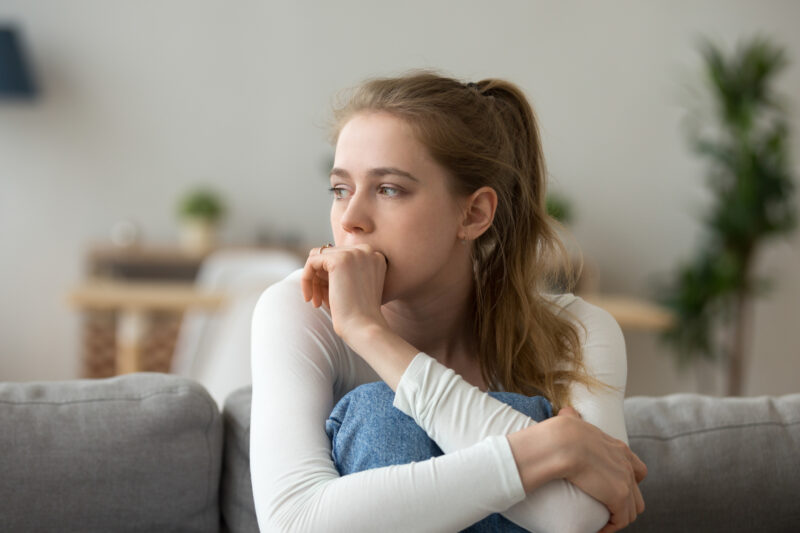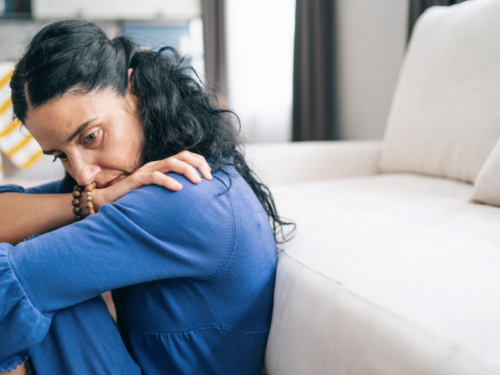
Table of Contents
Here’s How Exposure Therapy for Social Anxiety Works

Written By: Sarah Fielding

Clinically Reviewed By: Sarah Lyter
November 5, 2024
4 min.
A person living with social anxiety disorder can explore exposure therapy with the help of a mental health professional.
Learn more about our Clinical Review Process
Table of Contents
The world can be scary, requiring you to interact with others at the drop of a dime, go to unpredictable places, and deal with uncertainty. These realities can be anxiety-inducing for anyone, especially those living with an anxiety disorder like social anxiety disorder—a condition formerly known as social phobia, defined by anxiety symptoms that manifest in social or performance situations.
National data shows that just over one in 10 (12%) U.S. adults will experience social anxiety disorder in their lifetime, and it also commonly co-occurs with other anxiety disorders, such as panic disorder. However, the condition can be managed with the right care. Below, we dive into how social anxiety disorder presents and the use of exposure therapy in its treatment.

Healing from social anxiety disorder is possible
Virtual, intensive therapy from the comfort of home.
Signs and symptoms of social anxiety disorder
Indicators of social anxiety disorder typically present in a social situation — or when thinking about entering one. According to Senior Primary Therapist Sarah Lyter, LCPC, MA, signs of social anxiety disorder can be behavioral, physical, and cognitive. Common symptoms can include:
- Avoiding social situations
- Isolating oneself from and in social situations
- Negative self-talk
- Overanalyzing events and interactions
- Intense fear of judgment
- Physical signs like muscle tension, rapid heartbeat, and stomach issues

How does exposure therapy for social anxiety disorder work?
Each of the symptoms of social anxiety disorder can cause discomfort and disruption in a person’s life, no matter their age. There are multiple ways a person can cope with social anxiety disorder, including exposure therapy, a form of cognitive behavioral therapy (CBT). So, how does exposure therapy work, and what can it do for someone living with social anxiety disorder?
Exposure therapy is, simply put, being safely exposed to your fears with the guidance of a mental health professional. “Exposure therapy works by systematically decreasing the fear response when exposed to fearful stimuli in a safe, methodical manner,” explains Lyter. “One of the first things you do is create a fear hierarchy, during which you identify the fearful stimulus and how distressing it is to you. You then are exposed to those stimuli beginning at the least distressing and eventually up to the most distressing stimuli, until the distress is either reduced or the client is able to tolerate the fear/anxiety without any functional impairment.”
Lyter explains that exposure therapy can help you limit avoidance behaviors, improve coping skills, help with confidence, reframe unhealthy thinking patterns, and improve resilience to triggers or any feared situation.
Example of exposure therapy for social anxiety disorder
Living with social anxiety disorder makes you a good candidate for exposure therapy, though the process itself varies based on what your fears are and where your comfort levels lie. Say, for example, the idea of going to a store gives you incredible anxiety and fear. According to Lyter, a mental health professional will support you in breaking down how much distress each part of the process gives you.
“It may look like thinking of going to the store alone creates distress on a 3/10 scale, driving towards the store then creates 5/10, parking in the parking lot is 6/10, walking up to the store is 8/10, and going in is 10/10,” she explains. “The therapist would work with this client to first begin thinking about going to the store in session and tolerating that anxiety at a 3/10 until it no longer feels as fearful and is reduced to a 1 or 2/10.” From there, you might drive to the store until you’re able to tolerate it or the fear reduces. Then you go to the parking lot until reaching that better point before walking up to the store and, lastly, going into it.
Some components of exposure therapy—such as thinking about going to a store—can happen during your session with a mental health professional. However, an exposure exercise like going to a store or another space that triggers your anxiety doesn’t exactly work from inside a room or during online therapy. In these cases, Lyter says, “the therapist and client will create a plan for the client to safely experience these stimuli between sessions.”
A therapist might recommend having a support person accompany you on planned outings, creating a safety plan for when your mental health turns negative, and taking steps to increase self-care. Virtual reality exposure therapy has also been shown to be effective in studies.

How Charlie Health can help
If you or a loved one are struggling with social anxiety disorder, Charlie Health is here to help. Our virtual Intensive Outpatient Program (IOP) provides more than once-weekly mental health treatment for young people and families dealing with serious mental health conditions, including severe anxiety symptoms and anxiety disorders like social anxiety disorder, panic disorder, and generalized anxiety disorder.
Our expert clinicians incorporate evidence-based therapies into individual counseling, family therapy, and group sessions, including cognitive behavioral therapy (CBT) and exposure therapy as needed. With this kind of holistic treatment, managing your anxiety is possible. Fill out the form below or give us a call to start healing today.
References
https://www.ncbi.nlm.nih.gov/books/NBK519712/table/ch3.t12/
https://www.nimh.nih.gov/health/statistics/social-anxiety-disorder
https://www.tandfonline.com/doi/full/10.1080/10615806.2024.2392195#abstract




